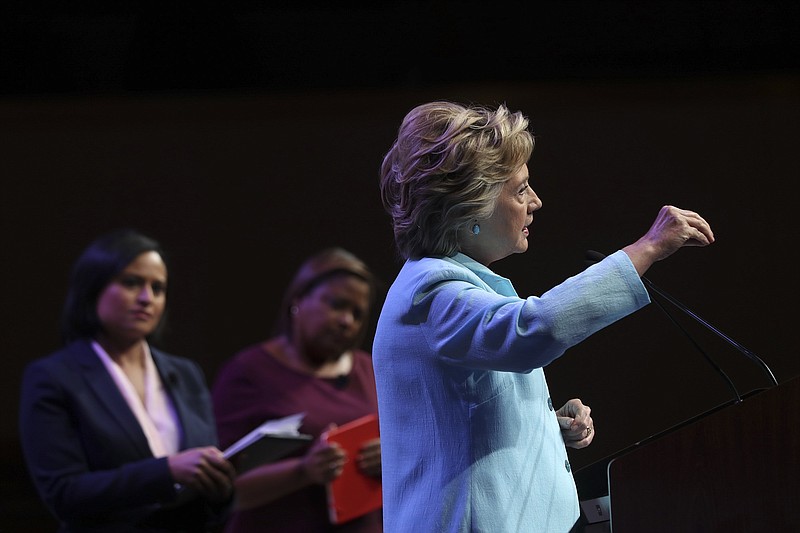Whom do we believe in this fractured election year?
It's looking more and more - and with good reason - that ordinary people and voters are believing Hillary Clinton and the Democrats who support her.
Polls - those things that Donald Trump touts and believes when they are in his favor - showed last week that even red-block Georgia may be leaning blue in the presidential race.
An Atlanta Journal-Constitution poll last week showed Clinton with a 4-point lead. Another poll released Monday by JMC Analytics increased Clinton's Georgia polling lead to 7 points - 44 to 37 percent. The newest poll also shows Libertarian nominee Gary Johnson taking 7 percent.
But back to candidate believability: For months now, we've seen Trump talk about deporting 11 million Hispanic immigrants and talk about building a wall between Mexico and America with no more specifics than a vague assertion that Mexico will pay for it because, according to him, Mexico sends us their rapists and drug dealers. For months, we heard him talk about barring Muslims from entering the United States on the basis of their religion, and in recent weeks we've heard him disparage the Muslim parents of an American war hero who was killed in Iraq.
We saw him double-down on statements about seeing Muslims celebrate 9/11 and about seeing a televised video of pallets of cash moving to Iran from the U.S. in exchange for hostages (complete fabrications that his campaign finally had to walk back when news networks insisted there was no such video). We've heard him disrespect John McCain and thumb his nose at House Speaker Paul Ryan, while expressing support for Ryan's competition.
Yet suddenly Friday, as it became clear Trump was falling behind in polls, he was endorsing Ryan, McCain and other Republicans. Then, while reading from a handheld script, he said: "I understand and embrace the wisdom of Ronald Reagan's big tent within the [GOP] party. Big, big tent."
Will the real Donald Trump please stand up?
Fact-checking organizations have shown over these long months that at least 70 percent of what Trump says is simply not true. Yet, somehow, Trump - and the pundits - shrug over his remarks and keep raising the specter of Clinton's "trustworthiness."
Despite eight congressional investigations, 11 hours of Clinton testifying before Congress, an FBI investigation and several hours of testimony from FBI Director James Comey - television pundits are still tilting at the Clinton email windmill.
At the end of July, the emails made headlines again when Fox News labeled Clinton's comments to Fox host Chris Wallace "lying" after Wallace suggested that Comey in testimony contradicted her claims.
Clinton said to Wallace: "Chris, that's not what I heard Director Comey say, and I thank you for giving me the opportunity, in my view, to clarify. Director Comey said my answers were truthful, and what I've said is consistent with what I have told the American people, that there were decisions discussed and made to classify retroactively certain of the e-mails. I was communicating with over 300 people in my e-mailing. They certainly did not believe and had no reason to believe that what they were sending was classified. In retrospect, different agencies come in and say, well, it should have been, but that's not what was happening in real time."
Specifically, about the "truthful" answers, Comey in his testimony said: "We have no basis to conclude she lied to the FBI."
Comey also said (but Wallace didn't mention) that none of Clinton's emails were properly marked classified, and a person with expertise would have reasonably inferred they were not classified.
In the testimony hearing, Rep. Matt Cartwright asked if the classified emails were properly marked according to the manual - "with the little 'Cs'?"
Comey: "[N]o There were three e-mails. The "C" was in the body, in the text, but there was no header on the e-mail or the text."
Cartwright: So if Secretary Clinton really were an expert at what's classified and what's not classified, and were following the manual, the absence of a header would tell her immediately that those three documents were not classified. Am I correct in that?"
Comey: "That would be a reasonable inference."
So, just to clarify - when Trump almost daily claims he didn't say something that he is on videotape saying, or makes claims that reasonable people question and his campaign or party later have to refute, back-track or gloss over, he's still to be believed, especially when he suddenly starts reading from a script?
But when Hillary Clinton tells Fox News or anyone else that she's glad to "clarify" something, her trustworthiness is, yet again, instantly questioned?
Maybe instead, the trustworthiness of national reporters and major news talk show hosts should be examined.
Perhaps instead, these news hosts might want to ask our two candidates to square their economic, domestic and foreign policies against what they can reasonably accomplish with a severely dysfunctional Congress.
